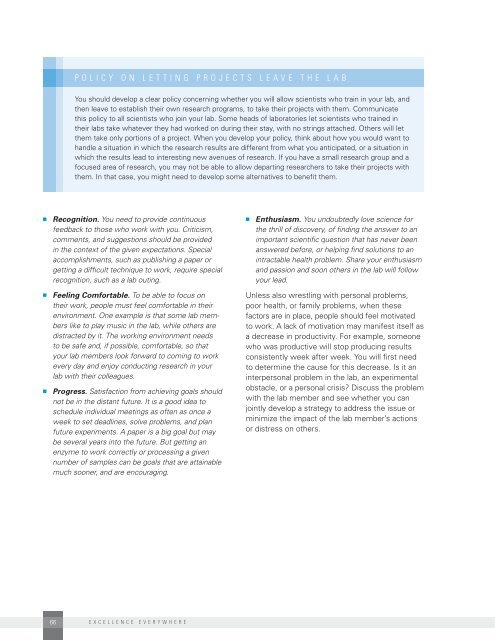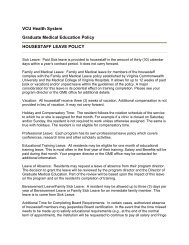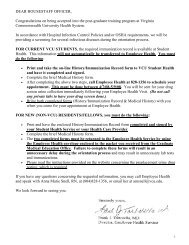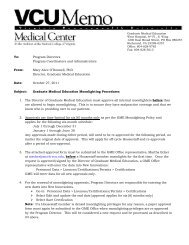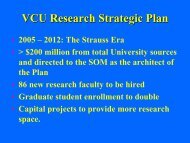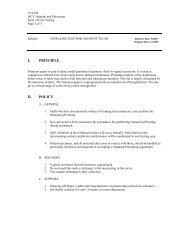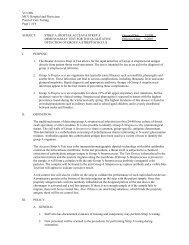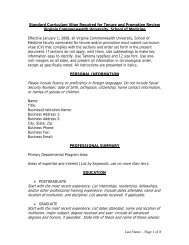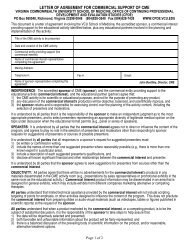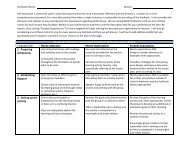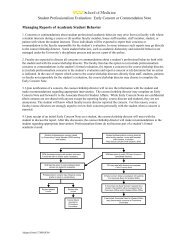Policy on letting projects leave the labYou should develop a clear policy concerning whether you will allow scientists who train in your lab, andthen leave to establish their own research programs, to take their projects with them. Communicatethis policy to all scientists who join your lab. Some heads <strong>of</strong> laboratories let scientists who trained intheir labs take whatever they had worked on during their stay, with no strings attached. Others will letthem take only portions <strong>of</strong> a project. When you develop your policy, think about how you would want tohandle a situation in which the research results are different from what you anticipated, or a situation inwhich the results lead to interesting new avenues <strong>of</strong> research. If you have a small research group and afocused area <strong>of</strong> research, you may not be able to allow departing researchers to take their projects withthem. In that case, you might need to develop some alternatives to benefit them.n Recognition. You need to provide continuousfeedback to those who work with you. Criticism,comments, and suggestions should be providedin the context <strong>of</strong> the given expectations. Specialaccomplishments, such as publishing a paper orgetting a difficult technique to work, require specialrecognition, such as a lab outing.n Feeling Comfortable. To be able to focus ontheir work, people must feel comfortable in theirenvironment. One example is that some lab memberslike to play music in the lab, while others aredistracted by it. The working environment needsto be safe and, if possible, comfortable, so thatyour lab members look forward to coming to workevery day and enjoy conducting research in yourlab with their colleagues.n Progress. Satisfaction from achieving goals shouldnot be in the distant future. It is a good idea toschedule individual meetings as <strong>of</strong>ten as once aweek to set deadlines, solve problems, and planfuture experiments. A paper is a big goal but maybe several years into the future. But getting anenzyme to work correctly or processing a givennumber <strong>of</strong> samples can be goals that are attainablemuch sooner, and are encouraging.n Enthusiasm. You undoubtedly love science forthe thrill <strong>of</strong> discovery, <strong>of</strong> finding the answer to animportant scientific question that has never beenanswered before, or helping find solutions to anintractable health problem. Share your enthusiasmand passion and soon others in the lab will followyour lead.Unless also wrestling with personal problems,poor health, or family problems, when thesefactors are in place, people should feel motivatedto work. A lack <strong>of</strong> motivation may manifest itself asa decrease in productivity. For example, someonewho was productive will stop producing resultsconsistently week after week. You will first needto determine the cause for this decrease. Is it aninterpersonal problem in the lab, an experimentalobstacle, or a personal crisis? Discuss the problemwith the lab member and see whether you canjointly develop a strategy to address the issue orminimize the impact <strong>of</strong> the lab member’s actionsor distress on others.66 excellence everywhere
Managing Conflictin the LabConflict is any situation where one person’sconcerns or desires differ from those <strong>of</strong> anotherperson. In the lab, conflicts <strong>of</strong>ten arise over “turfwars,” when two individuals are interested inthe same project. By staying on top <strong>of</strong> what eachmember <strong>of</strong> your lab is doing, you can <strong>of</strong>ten spotpotential problems and deal with them before theybecome too serious.Many people tend to avoid conflict. But we shouldthink <strong>of</strong> conflict as a creative part <strong>of</strong> our lives.Conflict has the potential to produce both positiveand negative effects. Depending on how it is managed,conflict can be constructive or destructive,stimulating or unnerving. It can produce higherquality results or stifle a project; it can lead to originalthinking or cause destructive power struggles.STYLES OF HANDLING CONFLICTDr. Kenneth W. Thomas and Dr. Ralph H. Kilmannprovide a useful model for evaluating an individual’sbehavior in conflict situations. The Thomas-KilmannConflict MODE Instrument describes a person’sbehavior in a conflict situation along two basicdimensions: assertiveness, that is, the extent towhich an individual attempts to satisfy his or herown concerns, and cooperativeness, that is, theextent to which an individual attempts to satisfythe concerns <strong>of</strong> the other person.These two basic dimensions <strong>of</strong> behavior can beused to define five specific modes <strong>of</strong> dealing withconflict that everyone is capable <strong>of</strong> using.Competing. This conflict-handling mode isassertive and uncooperative. A person whohandles conflict in this manner pursues his or herown concerns at the other person’s expense.They use whatever powers seem appropriate towin their position, including their ability to argue ortheir rank. This conflict mode works when you aredealing with a vital issue, an unpopular decision,or a decision that needs quick action. Althoughit sometimes seems justified, the mistake manyscientists make is to stay in an individualistic,competitive mode all the time. For example, if thehead <strong>of</strong> another lab asks you for a reagent that youhave not yet cited in a publication and that one <strong>of</strong>the people in your lab is using for a project, youmay decline to share the reagent until your labhas published a paper referring to it. The decisionwill probably make you unpopular with the otherscientist, but you are safeguarding the interests <strong>of</strong>your lab.Accommodating. This mode is unassertive andcooperative. In other words, it is the opposite <strong>of</strong>competing. Accommodators <strong>of</strong>ten neglect theirown concerns in order to satisfy the concerns <strong>of</strong>others. The accommodating mode may be appropriatewhen you want to build political capital orcreate good will, and for issues <strong>of</strong> low importance.However, keep in mind that the accommodatingmode can be a problem if you keep a tally andexpect that the other person will be accommodatingnext time. For example, you and your collaboratorare sharing a piece <strong>of</strong> equipment that just brokedown. He is insistent that you pay for the repairssince your lab uses it more. You do not agree, butyou give in on this one because you know that hislab uses all the other shared equipment more—soit will be his turn next time a piece <strong>of</strong> equipmentneeds repair.Avoiding. Avoidant behavior is both unassertiveand uncooperative. Those who avoid conflict donot immediately pursue their own concerns orthose <strong>of</strong> others. The conflict is never addressed byavoiders. Many times people will avoid conflictsout <strong>of</strong> fear <strong>of</strong> engaging in a conflict or becausethey do not have confidence in their conflictmanagement skills. However, avoiding can be agood strategy in cases where the person withwhom you are in conflict has much more powerthan you do or when issues are not that important.It is also a good strategy when you need tobuy time. An example <strong>of</strong> how to do this is to say“These are serious changes. I will need sometime to think about them.”managing your many roles67
- Page 3 and 4:
A R e s o u r c e f o r S c i e n t
- Page 5 and 6:
Table of ContentsVII119PrefaceChapt
- Page 7:
135 Chapter 10E x p a n d i n g Y o
- Page 15 and 16:
Q u e s t i o nq&aWhat Is a “Tenu
- Page 17:
preparing for immediate submission,
- Page 22 and 23:
Practicing the Talkn Practice your
- Page 24 and 25:
your one-on-one interviews you have
- Page 26 and 27: If talking directly about money is
- Page 28 and 29: When the institution responds and y
- Page 30 and 31: equipment and supplies. Maintenance
- Page 32 and 33: Q u e s t i o nq&aIs your instituti
- Page 34 and 35: Working With Human SubjectsWhether
- Page 36 and 37: RESPONSIBILITIES BEYONDTHE LABORATO
- Page 38 and 39: UNDERSTANDING YOURINSTITUTION AND H
- Page 40: Criteria for PromotionStructure of
- Page 45 and 46: Q u e s t i o nWhat’s in a Name?q
- Page 47 and 48: Screening ApplicantsWhen you review
- Page 50 and 51: Interpersonal Skillsn How important
- Page 52 and 53: Multinational Organizations are hir
- Page 54 and 55: n If there is an office that handle
- Page 57 and 58: n Seek funding and publish papers (
- Page 59 and 60: In fact, even though you yourself h
- Page 61 and 62: n Craft a statement that you feel c
- Page 63 and 64: n When you delegate authority to so
- Page 65 and 66: n Use only pens, preferably with wa
- Page 67 and 68: Strategy sessionsShould you decide
- Page 69 and 70: Finding Good Papers for Journal Clu
- Page 71 and 72: If possible, invite people in your
- Page 73 and 74: Q u e s t i o nq&aHow do I avoid po
- Page 75: The International Committee of Medi
- Page 79 and 80: steps for dealing with conflictWhen
- Page 81 and 82: chapter 5managing your time“ Succ
- Page 83 and 84: Check your work: the 90-year though
- Page 85 and 86: n Make and keep appointments with y
- Page 87 and 88: n Help them seek advice without tak
- Page 89 and 90: FAMILY MATTERSMany scientists face
- Page 91 and 92: chapter 6project management“ We m
- Page 93 and 94: My project is to get a grant funded
- Page 95: ObjectivesObjectives are the end re
- Page 98 and 99: The key events schedule and the act
- Page 100 and 101: Microsoft Project, a program that s
- Page 102 and 103: Martin, Vivien. Managing Projects i
- Page 104 and 105: appendix II: Example of a Work Brea
- Page 106 and 107: appendix iv: Example of a Gantt Cha
- Page 108 and 109: e h i n d c l o s e d d o o r s :w
- Page 110 and 111: Who might be interested in supporti
- Page 112 and 113: Call your program officerProgram of
- Page 114 and 115: direct costs vs. indirect costsDire
- Page 116 and 117: RESOURCESAllen, Ernest M. “Why ar
- Page 118 and 119: the next generation of students (th
- Page 120 and 121: Seek Feedback through a Formal Peer
- Page 122 and 123: Encouraging Student Questionsn Do n
- Page 124 and 125: Here are some ways you can help the
- Page 126 and 127:
n Are there curriculum changes unde
- Page 128 and 129:
a relaxed format for talking about
- Page 130 and 131:
spend in preparing an effective cou
- Page 132 and 133:
The Publishing ProcessTypes of Jour
- Page 134 and 135:
A word about impact factorsThe impa
- Page 136 and 137:
C r e a t i n g a n i n t e g r a t
- Page 138 and 139:
may need to take the first author p
- Page 140 and 141:
submitting image filesToday, most i
- Page 142 and 143:
Submitting your Paper to Another Jo
- Page 144 and 145:
RESOURCESDavis, Martha. Scientific
- Page 146 and 147:
increase your impact as a scientist
- Page 148 and 149:
Q u e s t i o nq&aHow do I communic
- Page 150 and 151:
n Offer criticism and correction in
- Page 152 and 153:
It is important to discuss career g
- Page 154 and 155:
When Mentoring,Advisory, or Supervi
- Page 156 and 157:
For researchers in developing count
- Page 158 and 159:
n Is travel safe and convenient, or
- Page 160 and 161:
n The expected contribution of each
- Page 162 and 163:
Meetings. Set up systems to ensure
- Page 164 and 165:
SPECIAL CHALLENGESFOR THE BEGINNING
- Page 166 and 167:
e an important connection to future
- Page 168 and 169:
The invention of a new method or pr
- Page 170 and 171:
licensee, who can charge others for
- Page 172 and 173:
Most profound for developing countr
- Page 174 and 175:
Finally, the patents have been chal
- Page 176 and 177:
And, India benefited as a supplier
- Page 178 and 179:
paperwork involved in purchasing1.
- Page 180 and 181:
labeling mattersA case in point: In
- Page 182 and 183:
equipment, freeze-drying equipment,
- Page 184 and 185:
Responsibilityfor materialsIf an or
- Page 186 and 187:
Recent Improvementsin Materials Tra
- Page 188 and 189:
“Knowledge is power.” —Sir Fr
- Page 190 and 191:
MOUMemorandum of UnderstandingRFPRe
- Page 192 and 193:
notes continued182 excellence every
- Page 194:
notes continued184 excellence every


